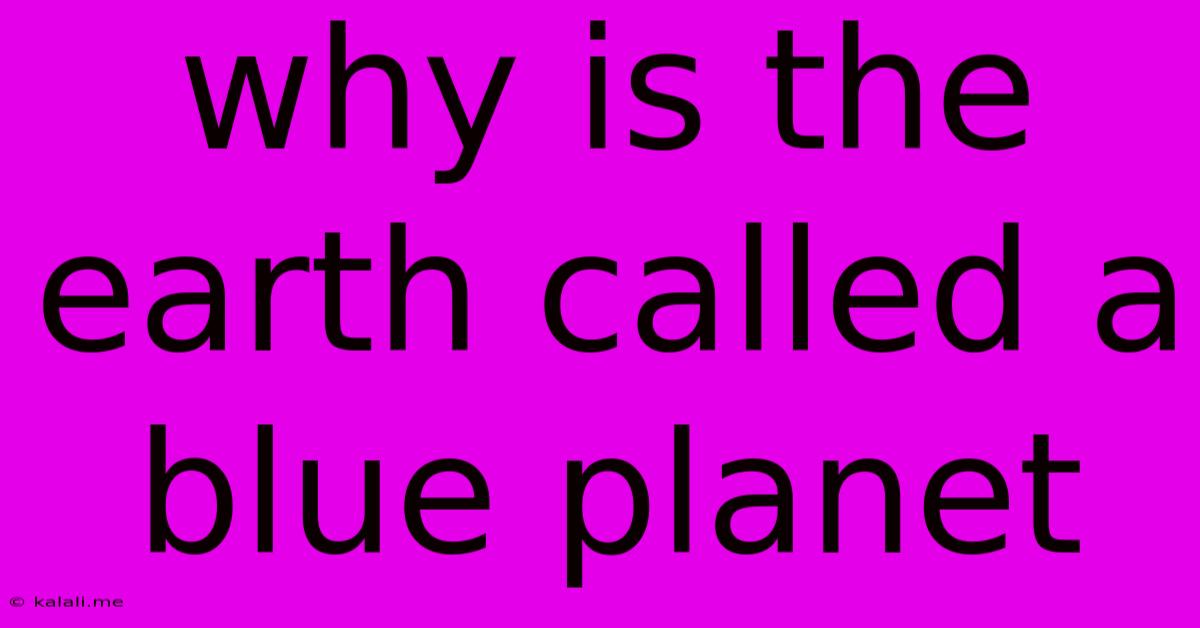Why Is The Earth Called A Blue Planet
Kalali
Jun 14, 2025 · 3 min read

Table of Contents
Why is Earth Called the Blue Planet? A Deep Dive into Our Ocean World
Earth, our home, is often referred to as the "blue planet." But why? This isn't just a whimsical moniker; it's a direct reflection of our planet's dominant feature: water. This article will explore the reasons behind this captivating nickname, delving into the significance of Earth's vast oceans and their impact on our planet's unique characteristics.
The striking blue hue observed from space is primarily due to the abundance of water covering approximately 71% of Earth's surface. This massive expanse of interconnected oceans, seas, and lakes reflects sunlight, scattering blue light more effectively than other colors. This phenomenon, known as Rayleigh scattering, is the same reason why the sky appears blue. The deeper the water, the more intense the blue color appears. Think of the deep azure of the Pacific Ocean compared to the shallower, more turquoise waters of the Caribbean.
The Role of Oceans in Earth's Habitability
The vast ocean isn't just a pretty sight; it plays a crucial role in making Earth habitable. Here are some key reasons:
-
Regulation of Temperature: Oceans act as massive heat reservoirs, absorbing and distributing solar energy, moderating global temperatures and preventing extreme temperature fluctuations. This temperature regulation is essential for life as we know it.
-
Climate Control: Ocean currents act like a global conveyor belt, transporting heat around the planet, influencing weather patterns and rainfall distribution. The interaction between the ocean and atmosphere is key to understanding Earth's climate system. Changes in ocean currents, therefore, can significantly impact global climate.
-
Biodiversity Hotspot: The ocean teems with life, supporting an incredibly diverse range of species, from microscopic plankton to massive whales. This biodiversity is essential for maintaining the health of the planet's ecosystem. Ocean health is intricately tied to global health.
-
Oxygen Production: Phytoplankton, microscopic marine plants, are responsible for a significant portion of the oxygen we breathe. They are the foundation of the marine food web and are vital to the Earth's oxygen cycle.
-
Carbon Sink: Oceans absorb a large amount of atmospheric carbon dioxide, acting as a crucial carbon sink and mitigating the effects of climate change. However, the ocean's capacity to absorb CO2 is not unlimited, and oversaturation poses significant environmental concerns.
Beyond the Blue: Other Factors Contributing to Earth's Appearance
While the oceans are the primary reason for Earth's blue appearance, other factors contribute to its overall visual appeal from space. These include:
-
Clouds: The swirling white and grey patterns of clouds reflect sunlight and add another dimension to Earth's appearance.
-
Landmasses: Continents and islands provide contrasting shades of green, brown, and white, adding to the planet's diverse and vibrant colors. The interplay of land and water is a key feature of Earth's unique geography.
-
Ice Caps and Glaciers: The brilliant white of polar ice caps and glaciers further contributes to the diverse visual landscape. These areas are sensitive indicators of climate change, with significant melting affecting sea levels and global ecosystems.
In conclusion, Earth's designation as the "blue planet" is a testament to the overwhelming presence and importance of its oceans. These vast bodies of water are not merely a beautiful feature but are essential for life, regulating climate, supporting biodiversity, and playing a crucial role in the planet's overall health. Understanding the significance of Earth's blue oceans is crucial to appreciating the delicate balance of our planet and the need for its protection.
Latest Posts
Latest Posts
-
What Is The Correct Order Of Piagets Stages Of Development
Jun 15, 2025
-
Herzbergs Motivational Factors Are Similar To Maslows
Jun 15, 2025
-
The Radius Of A Sphere Is 6 Units
Jun 15, 2025
-
Sare Jahan Se Acha Who Wrote
Jun 15, 2025
-
Non Metal That Is A Liquid At Room Temperature
Jun 15, 2025
Related Post
Thank you for visiting our website which covers about Why Is The Earth Called A Blue Planet . We hope the information provided has been useful to you. Feel free to contact us if you have any questions or need further assistance. See you next time and don't miss to bookmark.